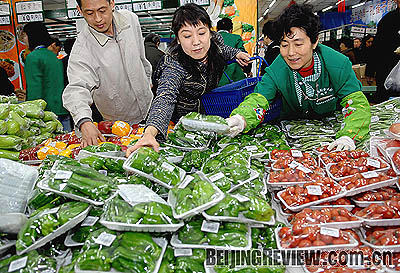|

A TIGHTENING HAND: The Chinese Government has forged a tightening monetary policy to prevent overheating of the economy and alleviate inflation
XIE HUANCHI
China's consumer price index (CPI) went up 8 percent in the first quarter of 2008, giving regulators greater cause to push through a tightening monetary policy. Meanwhile, on the other side of the Pacific Ocean, the subprime mortgage meltdown is taking its toll on the U.S. economy. Worries are now bubbling that the crisis may spill over to the nascent Chinese financial markets. The 21st Century Business Herald, a Chinese financial newspaper, recently convened a group of eminent economists to discuss how to strike a balance between taming inflation and maintaining economic growth. Yu Yongding, Director of the Institute of World Economics and Politics under the Chinese Academy of Social Sciences, Wu Hemao, professor at the China Center for Economic Research under Peking University, Huang Yiping, Managing Director of Citigroup's Asia Pacific Economic and Market Analysis, Xie Duo, President of China Foreign Exchange Trade System, and Xu Gang, Managing Director of CITIC Securities, give their opinions in the following excerpts:
Amid the uncertainties clouding the Chinese economy, what kind of macro-economic policies should be taken?
Yu Yongding: As the core of the current macro-economic controls, a tightening monetary policy should take keeping price surges at bay as its goal. All our strength should be exerted to dampen expectations for inflation and hold the inflation rate down to 4-5 percent. To dissipate inflationary jitters, we have to withstand the pain of softening economic growth. The 8-percent target for this year's economic growth set by the Central Government is acceptable, leaving room to digest losses arising from inflation. Interest rate hikes can moderate the burning-hot real estate investments and quell impulses of local governments to invest blindly. When the overheating economy calms down and the driving force for property prices wanes, resource allocation will lean toward agricultural production. The society will then also be rendered more able to bear the price inflation for agricultural products. Through wielding quantity or price instruments, the monetary policy of China is bound to tighten. Subsequent problems will find solutions by themselves.
Wu Hemao: I think two aspects can be considered to approach the monetary policy.
The first is whether the interest rate can play a better role in guiding the economy. Deducting the inflation rate, China's current interest rate for one-year fixed deposits has dipped into negative territory, and the real lending interest rate also lingers at a low level. Some argue that low interest rates will lure deposits into the capital market, which can buoy its development. But I don't think so. The free-flowing money may stir up turbulence in the capital market. Low, or even negative interest rates, will pose an extra disincentive for people to put their wealth in the bank. And banks will also be stripped of their functions as financial intermediaries. Some other detrimental consequences will pop up, such as the rise of black-market lending. Beside this, low interest rates will absolutely breed inefficiency of credit rationing and capital flows. The Asian Financial Crisis 11 years ago can still awaken bitter memories. One of its root causes was just inefficient investment. Now the old worry nags again. Will low-yielding projects go bust? Will this year's profits turn into the non-performing loans of next year, and spark fresh financial crisis fires? All these are reasons for us to fret.
The second aspect is whether credit regulation still has room to improve. The Central Government has vowed to grapple with economic overheating and inflation. Yet what many private and small and medium-sized enterprises perceived was not overheating, but a chill. Since last year, they have been facing heavy pressure. The credit clampdown cut off their capital supplies, putting them in a bind or even on the edge of bankruptcy. So we are scratching our heads for a better method of credit regulation. In a low-interest rate era, when extending loans by credit rationing, banks often favor those with closer connections with themselves, but not those more efficient in investments. As a result, blind investments will mushroom. Inflation should by no means be curbed at the cost of efficient investment.
Huang Yiping: I am a strong advocate of tightening monetary policy, but a more relaxed fiscal policy is also needed. On one hand, as our external economic climate cools down, we are ambushed by higher risks. On the other hand, factor prices are skyrocketing. In the past years, the costs of labor, land use, resources and costs related to environmental protection have been distorted. This shored up the economic boom, but also exacerbated structural economic imbalances.
|
